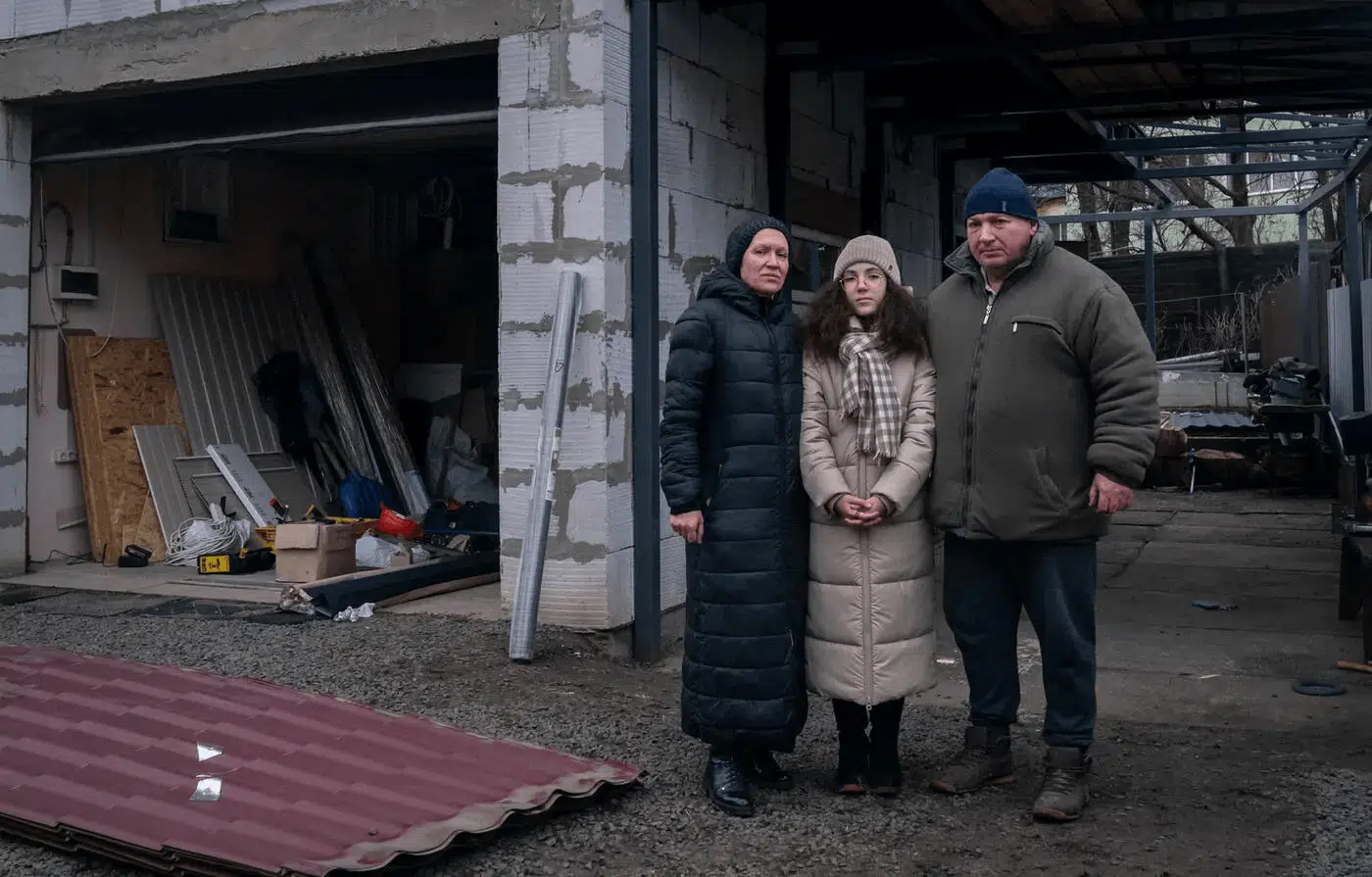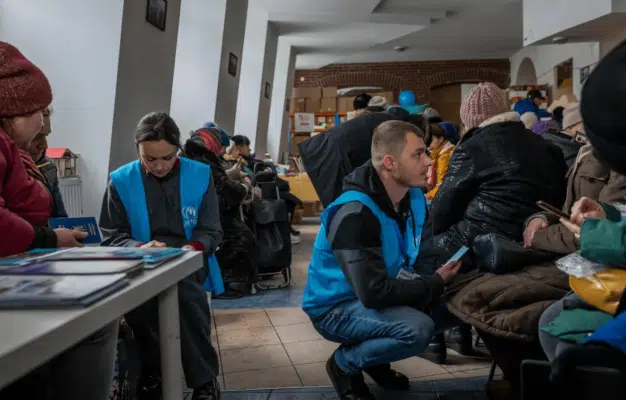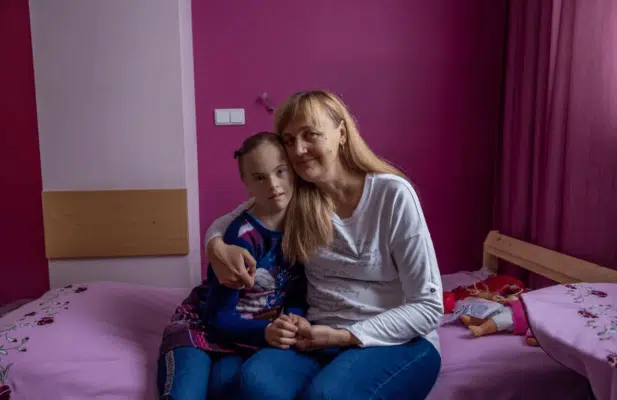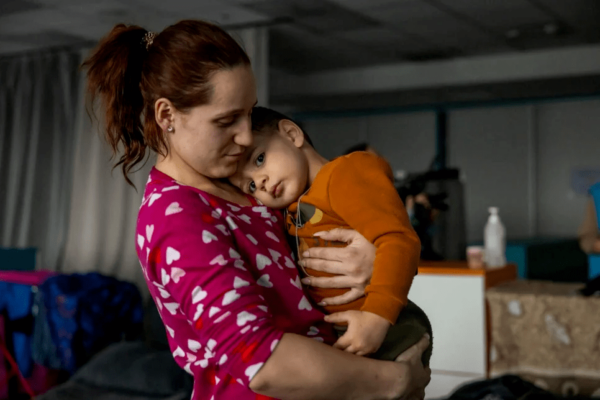
Olena, her daughter Bohdana and husband Andrii stand in the backyard of their recently repaired home in Borodyanka in Ukraine’s Kyiv oblast in January 2023. © UNHCR/Diana Zeyneb Alhindawi
Faced with huge destruction to civilian infrastructure, UNHCR, with EU humanitarian aid support carries out repairs to family homes where the impact goes far beyond bricks and mortar.
For the past 30 years, Liudmyla Bantsyr has grown vegetables on a large plot of land beside her house in Ozershchyna, a rural village an hour west of Kyiv. Now aged 70, she still harvests hundreds of kilograms of potatoes each year by hand, storing them for the months ahead in an underground root cellar in her yard.
The cold, dark space provides ideal storage, with potatoes piled high in a wooden trough at one end beneath a curved brick roof. But following Russia’s full-scale invasion of Ukraine last year, Liudmyla endured weeks of terror alone in the cellar as she sought to preserve herself from the hostilities that raged overhead.
“When the shooting started, I ran to the cellar. [There were] shells from this side, and from that side. You couldn’t get out. I spent a month in that cellar,” Liudmyla said.
During lulls in the fighting, she would briefly emerge to feed her dog and flock of chickens before heading back underground. With only a candle for light, at night she would swaddle herself in blankets and sleep on wooden planks laid over the mound of potatoes, hugging the wall nearest the entrance for fear of being buried by an explosion.
“I was very afraid. It was cold, but I had to endure it,” she said.
After one particularly heavy blast, she came outside to find five of her neighbours’ abandoned homes ablaze and her own badly damaged.
Despite the danger, Liudmyla refused to leave even when most of the other villagers fled. “I just did not want to leave everything,” she explained. “My mom and dad … and a son are buried here. So I’m not going anywhere. My place is here.”
When the fighting in the area ended, she was able to assess the damage to her home. The property’s fence and a shed had been destroyed, several windows blown out and the roof peppered by shrapnel. “The roof was riddled with holes, like a sieve,” Liudmyla said. “When it snowed and then melted, it all flowed into the house. I tried to patch it, but the house was exposed to the elements.”
Keeping warm and dry was a constant struggle, but worse was the lingering sense of insecurity. “I couldn’t sleep at night I was so afraid. They restored the power within a week, but I didn’t switch on the lights. I just lit the oven, locked the doors, and went to bed.
Essential repairs
With only enough savings to replace the windows, Liudmyla feared the approaching winter. But in late summer 2022, help arrived in the shape of an assessment team from UNHCR, the UN Refugee Agency and its local NGO partner, Rokada, which approved repairs to her roof and fence that were carried out by local contractors.
Supported by funding from EU Humanitarian Aid, UNHCR has engaged construction teams in several regions across Ukraine to carry out essential repairs to homes damaged during the war.
These light and medium repairs include replacing windows and doors and repairing damaged roofs and walls, ensuring that families can remain warm and secure in their own homes and communities rather than being forced to find alternative accommodation elsewhere. To date, over 5 million people have been forced to flee within Ukraine to escape the hostilities.
Some 20 kilometres from Ozershchyna in the town of Borodyanka, one of the construction crews contracted by UNHCR is driving to its latest job, roofing materials strapped to the roof of the small Lada car with the builders squeezed inside. They have carried out repairs to many houses in the town and know what it means to residents there.
“They are thankful that we come to do it. When we arrive, they offer us tea … and ask if we need any help,” says builder Rafael. “People are thankful to these organizations, otherwise many of them would have no housing. Instead, they are happy, living in their own places.”
Rafael and his team know from personal experience what it means to be forced from home. They are originally from the eastern Donetsk oblast but were forced to flee with their families last year after the outbreak of full-scale war. While the fighting continues back home, Rafael and his colleagues remain focused on the urgent task at hand.
“It is not about how we are feeling, but about seeing the eyes of the people who are happy that their houses are being repaired,” he explained. “It is important not to stop working also because of the snow and rain. We have to keep repairing houses for people.”
Giving comfort
Among those to benefit from repairs in Borodyanka were Andrii and his wife Olena, whose house lies in the centre of town. The retired couple’s daughter Bohdana is a promising pianist and attended a nearby music school. Following the invasion, the family initially sought safety with relatives in Zhytomyr, a city 100 kilometres west, but as the fighting spread, they fled to Poland to stay with the couple’s older son.
While there, they received word that a neighbour’s house had burned down during the intense fighting that swept through the centre of their town. Drone footage of the neighbourhood on a news report appeared to confirm their worst fears, but when Andrii returned home, he was relieved to find the house damaged but still standing.
“I hugged the walls of my home, which had remained standing. At least there was hope for living here in the future,” he said. “[But] everything was riddled with bullet holes and shrapnel. The wind was blowing through the house, the walls were shot through.”
Miraculously, a large piece of shrapnel had blown a hole through the wall of Bohdana’s bedroom, passing within inches of her piano, but besides the twisted remains of a music stand, the instrument was undamaged.
A repair crew recently carried out extensive repairs, replacing doors and windows and repairing the damage to the roof and walls, giving the family what Andrii says is “as much comfort as is possible” while the war continues.
Bohdana has been unable to return to school after it was destroyed during the hostilities, but she is taking lessons online and is thankful that her piano survived. “I’m very happy that I can play,” she said. “When I hear some sad news on the TV then I play the piano and it calms me down.”
Back in Ozershchyna, Liudmyla recently celebrated her 70th birthday by hosting a small gathering at home for friends in the village. She spent the previous day preparing local dishes from her own produce, including chicken stew thickened with potatoes, livid pink beetroot salad and plates of sour pickles, washed down with a fiery spirit called horilka distilled using more of her potatoes.
“I like to treat my guests well,” she said, and was happy to host them in a house that is once again warm and secure. The joyful celebrations also revealed how the impact of the repairs went far beyond the roof and walls of the building itself.
“I like living here,” Liudmyla explained. “Our village is very friendly. If you approach someone and ask for help, they never refuse. The most important thing is that our community is united.”
Originally published by UNHCR on 07 June 2023.





